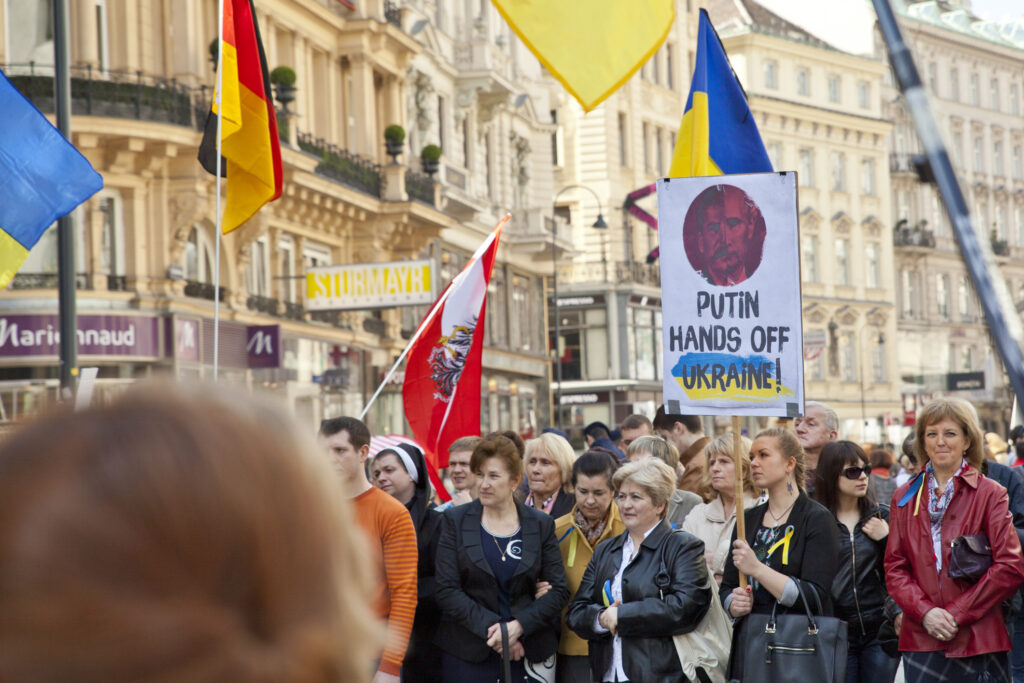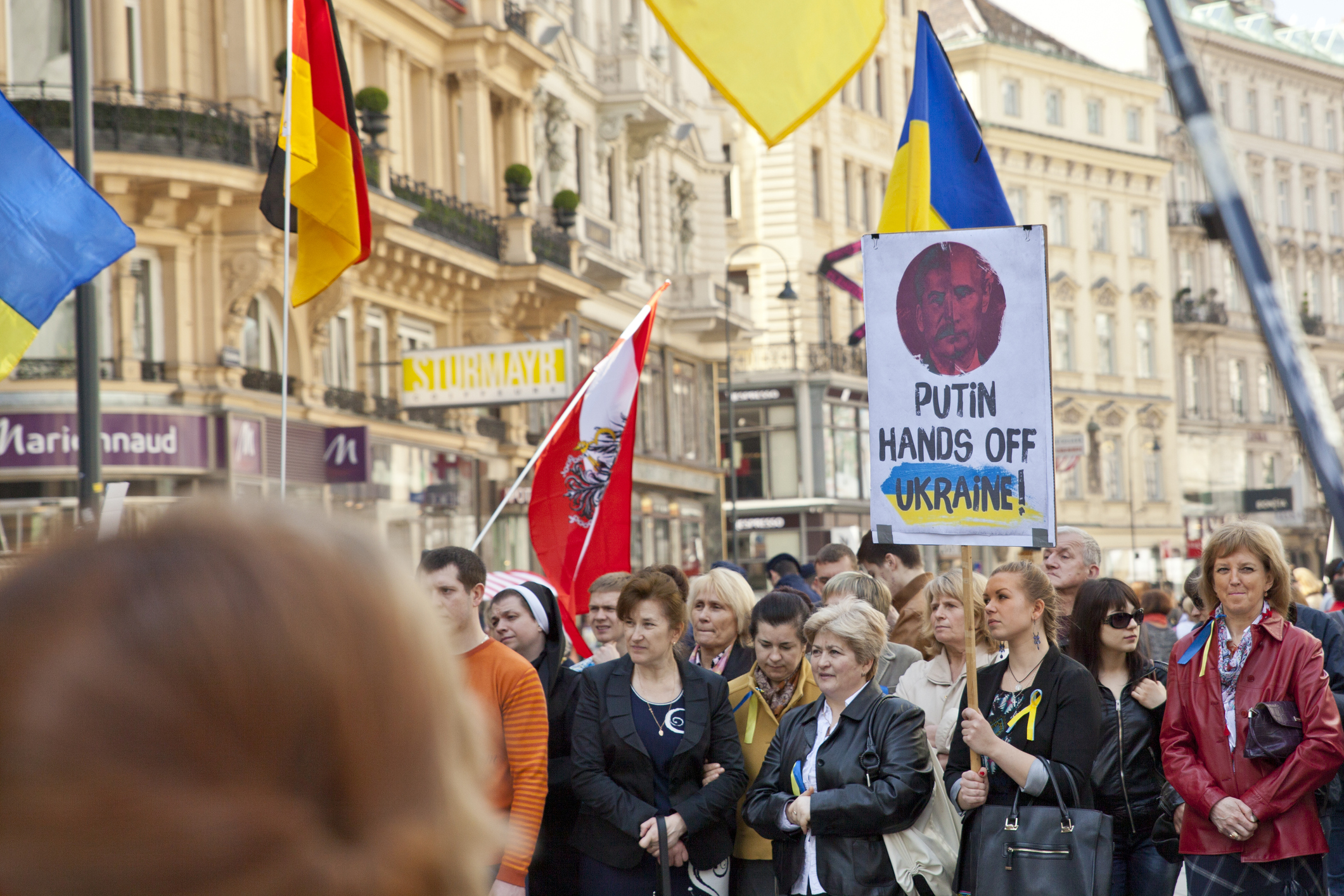By: Lexi Blakes

Thursday, Feb. 24, U.S. President Joe Biden announced additional sanctions on Russian banks in light of the recent escalation of the Russia-Ukraine conflict. The crisis has been mounting since tensions developed in 2014, when protesters in Ukraine overthrew President Viktor Yanukovych, who was partisan to Russia’s interests. That same year, Russia invaded and annexed the Ukrainian peninsula of Crimea. In the years following, the Minsk Accords were signed by Russia, Ukraine, France and Germany, but it did little to protect Ukraine from Putin’s ambitions.
Now, in 2022, Putin has ordered a full-scale invasion of Ukraine. Citing pro-Western revolutions and NATO eastward expansion, Putin declared that Russia did not feel safe to “develop and exist” because of the “constant threat from Ukraine.” Russia’s Deputy Foreign Minister Sergei Ryabkov is also quoted, explaining that “for us it is absolutely mandatory to ensure Ukraine never, ever becomes a member of NATO.” The Russia-Ukraine crisis was initiated by Putin primarily to threaten NATO into moving military infrastructure further from Russia and to return to pre-1997 borders.
As Russian troops near the capital, Ukrainian refugees rush to flee the country as the war devastates families and threatens the future of the country and its people. In a statement released to the American people, President Biden affirmed that “the United States and its allies and partners will respond in a united and decisive way … the world will hold Russia accountable.” Seasoned political analysts have been cautiously monitoring the possibility of a third world war within this century, as tensions between countries have continuously escalated. With the introduction of enhanced nuclear weaponry possessed by nine countries across the world – ranging from the U.S., United Kingdom, and France to Pakistan, China, India and North Korea – every intercountry conflict has a dangerous undertone of a new age.
Times like these are such that no person ever expects to experience in their lifetime. There are aspects of the Russia-Ukraine crisis that are reflective of the U.S. military involvement in the Middle East and the Israeli-Palestinian conflict as the human right to safety and liberty is once again challenged. In response to this unprovoked attack on sovereignty, widely enforced sanctions have had a significant impact on the Russian economy. Within the last week, Russia has lost a shocking $200 billion in stock market value. As of Monday, February 21st, the ruble fell as low as 80.2 against the dollar. Russian banks and oil companies were among the hardest hit, as sanctions threaten their oil-dependent economy. Sberbank, Russia’s largest lender, lost a record 43 percent of their value. Amid such economic instability, Russia’s central bank instructed brokers to suspend short sales.
Even with such high market volatility and a serious economic downturn, Russia continues to push forward in their attacks. With Ukraine in a state of duress, countries around the world, including the E.U., U.K., Japan, and Canada, are putting intense pressure on Russian banks by cutting them off from the international Swift payment network. This network allows for the transfer of funds across borders, and there is hope that these sanctions will force Putin to call a ceasefire. In addition, Germany has halted approval of Russia’s Nord Stream 2 gas pipeline, which was a major investment by both Russia and European companies. Even amid pressure from other countries to end the war, Russia has only agreed to discuss a diplomatic solution if Kyiv surrenders and demilitarizes.
Russia’s war on Ukraine has forced nations to evaluate diplomatic ties and make difficult decisions. The question of whether to pick a side or remain impartial is up for debate in nations big and small. Possible repercussions of abandoning neutrality are ever present, but as Ukraine continues to fight for the lives of its citizens, countries are rallying behind their beliefs. Switzerland, Finland, Austria and Ireland have all declared their support for Ukraine, and they collectively announced to send aid, material and medical assistance. 35 other countries have remained neutral and five nations have backed Russia – namely Venezuela, Belarus, Eritrea, North Korea and Syria. It is the time for countries to decide who they are, what they represent, and what they will tolerate.
One large question still remains: “will the world allow a bully with a military to wage war on innocent people or will it stand up in protest?” It is a big question that carries an immense amount of risk, but citizens are looking to their leaders for the answer. The hopes of the world are mirrored in President Biden’s statement to the American people: “The prayers of the entire world are with the people” of Kyiv, and we are “praying for the brave and proud people of Ukraine.” Hopefully, this war will end soon, and all soldiers and refugees will get to return home.




